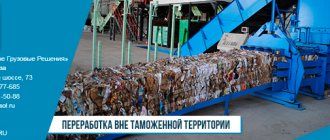28.12.2016
Among the usual customs procedures, one special one should be highlighted - refusal in favor of the state
.
Essentially, the name determines the sequence of actions (legislative regulations) when imported goods become state property due to gratuitous transfer
.
A distinctive feature of this event is that the customs refusal procedure does not require the payment of customs duties or other fees, including those related to non-tariff regulation
.
This procedure applies to all members of the customs union
.
Goods that may be subject to such regulations must meet the following conditions for their intended use:
:
- for enterprises duty free
;
- various types of processing in temporary storage warehouses;
- placed under the temporary import procedure, for example, on various types of Exhibitions
or
as samples
; - not participating in other customs regulations;
- imported on the basis diplomatic rules and laws
, including for personal consumption, by foreign citizens using
diplomatic immunity
.
Basic provisions
Refusal in favor of the state is a customs procedure consisting in the gratuitous transfer of foreign-made goods into the ownership of a state that is a member of the Customs Union. In this case, the company does not need to pay duties and taxes. Non-tariff regulation measures are also not used. Various foreign-made goods may be placed under the procedure under consideration, except for those that are prohibited from being imported into the territory of the Customs Union and put into circulation. Also, products for which the use of the procedure entails costs that cannot be reimbursed through its sale, including goods with an expired shelf life, cannot be placed.
In accordance with the Classifier of Types of Procedures, code “94” was assigned to refusal in favor of the state. The customs procedure is regulated by Ch. 43 TC CU, as well as Ch. 32 of the Law “On Customs Regulation” No. 289-FZ. It can be used in exhibitions, since the cost of return transportation is sometimes more expensive than the purchase of stands and other equipment for advertising. This encourages owners to transfer goods to the state.
The need to apply the procedure in question may be associated with delays during transportation, as well as fines imposed by carriers. As a result, the cost of a product for the purpose of its sale must be increased by an order of magnitude compared to existing prices on the market. Thus, calculations can show the advisability of rejecting the product, since this will lead to less losses than selling it. In addition, appropriate transfer to the state can have a positive impact on the company's business reputation.
The sale of goods becomes the task of government agencies, which transfer them to trading enterprises or organize auctions. Some products are also used for charity. They are transferred to social support authorities, as well as to nursing homes and children. The corresponding procedure also applies to those goods that were lost due to force majeure or accidents.
Regulatory regulation
Regulations and grounds for applying the customs regime for the refusal of imported goods in favor of the state are contained in the articles of the Labor Code of the Russian Federation dated May 8, 2015:
- Legal provisions of Art. 299-302 of the Law on Customs Activities.
- In paragraph 1 of Art. 310 clarifications are given on the application of the regime. Thus, it specifically states that during its application, the entire batch of imported products or part of it is transferred to the benefit of a country member of the Eurasian Union free of charge. This gives rise to the grounds for their exemption from import duties and taxation. The entire list of goods transferred under the customs regime of refusal are given a new legal status - they become the property of the entire Eurasian Union.
- In Art. 311 of the Code stipulates the conditions for placing products under a refusal regime. For example, these may be goods that are included in the list of prohibitions on their use in allied states. In this case: the refusal is made only in relation to imported products;
- the procedure is established by the legislative acts of the country, a member of the Eurasian Union.
Refusal in favor of the state (concept)
Foreign goods
The goods that the declarant can place under refusal in favor of the state (a customs procedure that allows reducing costs, as we found out above) include the following:
- Not placed under any regime.
- Placed under regimes such as duty-free trade, processing within customs or for domestic consumption, and admission and warehouse.
- Transported across the border by diplomatic missions, consulates and other official representations of states, international organizations, their personnel, as well as necessary for personal use by certain categories of foreigners who enjoyed privileges and/or immunity, in accordance with international agreements in force in our country.
The essence and purpose of the regime
The point of applying such a customs procedure is the impossibility of further selling imported products on the territory of Russia. Or such a need arises when the amounts of import duties and taxation increase, which leads to a loss of competitiveness with similar goods manufactured in local factories.
- The reason may also be the duration of transportation, delays in movement by sea vessels or railway delivery vehicles, or delays at the border.
- Payment of penalties to carriers leads to a significant increase in price from the original price of goods, which may affect further profitability of sales.
- Having clarified all the current circumstances and calculated all delivery costs, the supplier ultimately comes to the conclusion that it will be very difficult to sell the imported products, so he formalizes the customs procedure of refusal in favor of the state.
- A similar situation may arise during export - border crossing duties and fees may exceed the amount of the expected profit, and cause damage to the importer.
If the waiver regime is applied, the declarant will be exempt from paying all fees and duties.
But! If, for example, instead of the procedure for recycling goods that have expired or have become unusable due to inept transportation, the importer decides to place them under a regime of refusal in favor of the state, then he will not be given permission to carry out the procedure, but will be forced to spend money on full disposal.
The Russian customs control service strictly monitors such acts and does not allow situations to arise when imported goods require additional costs that cannot be covered by sales on the domestic market.
Principles
When goods are placed under the refusal procedure, the declarant immediately loses ownership, while a country that is a member of the Customs Union, on the contrary, gains it. The following principles are typical for a corresponding refusal:
- Material benefit. It means that the procedure may be refused if the proceeds from the sale do not cover the costs or the sale is impossible or limited.
- Immunity of the new owner. This protects the state from claims from others. This principle is that legal responsibility for the legality of disposal of goods rests with the declarant, and property claims are not reimbursed by customs.
- Special principles. These are: a prohibition to change the procedure in question to any other, the benefits of the state from the application of the waiver, as well as the exemption of customs from satisfying the claims of third parties in relation to property.
Filing a declaration
The current legislation does not clearly regulate the issue of the possibility of placing goods under refusal in favor of the state. It is necessary to eliminate gaps in the customs procedure, since in addition to auctions, other methods of selling goods are also used.
Legal regulation is based on the permitting principle. To obtain the appropriate permit, the declarant must submit an application or cargo declaration (FCD).
When submitting an application, Customs will nevertheless issue a declaration for statistical purposes. The addressee is the head of the customs department or his deputy, who has the right to give permission to place goods under the customs regime (or procedure). The application contains the following information:
- Product Name.
- Individual characteristics.
- Quantity.
- Reasons for refusal.
The authorized person signs the declaration, puts a stamp and writes: “Refusal is permitted.”
Responsibility and consequences
For an unlawful decision to transfer goods under the regime of refusal in favor of the state, the declarant may incur administrative or criminal liability, based on the severity of the act.
However, customs authorities do not have the legal right to compensate for material losses of third parties interested only in the sale of imported products into the territory of the state and receive income for them.
The video below will tell you about refusal in favor of the state and other regimes:
Refusal of the customs authority
In certain cases, customs is obliged to refuse such a procedure. This occurs when filing a declaration for the following goods:
- Which are prohibited from being imported into the territory of the vehicle.
- Which are released for the purpose of free circulation or declared for re-import.
- Weapons, related equipment, ammunition, RKK, military communications systems, drugs, poisons, radioactive waste, explosives, electricity and some other substances.
Other goods may be included in the list that are not subject to placement under the customs procedure of refusal in favor of the state. Customs officials have the right to act at their own discretion if they consider that there are “sufficient grounds” for making an appropriate decision.
If the refusal is allowed, then the declarant is obliged to deliver the goods to a place determined by customs, and at his own expense.
Transfer certificate
The content of the customs procedure for refusal in favor of the state includes an act of transfer, which confirms the change of owner. This paper is a document of strict accountability. At the request of the declarant, it can be drawn up in two copies. One copy is transferred to the previous owner.
The act must contain the following information:
- Date of preparation.
- The name of the company that transferred the goods.
- The name of the body that accepted it.
- Name, individual characteristics and quantity of goods transferred. The act is certified by the signatures and seals of the parties.
Who can use it and when?
Most often in international trade practice, such a regime is used in cases where payments of duties, taxes, excise taxes and customs duties significantly exceed the amount that could be received in the form of profit from sales.
Also influencing the decision to refuse in favor of the country are penalties for various types of downtime when transporting products to their destination. They are capable of increasing the initial cost of products and making them uncompetitive on the Russian market. Therefore, it is advisable to place them under this customs regime.
Mandatory conditions for the refusal procedure
Peculiarities
The procedure has a number of features. The characteristic financial conditions for placing goods under the customs procedure of refusal in favor of the state include the right of the declarant to demand the return of money. They are as follows:
- Only those amounts deposited with customs as security for payment of various customs duties are returned.
- The declarant is refunded import duties, VAT, as well as excise taxes that were paid during the re-export and processing procedure at the customs office.
- The amounts of export duties paid during the processing procedure outside the customs territory are also refunded.
- The previous owner has the right to expect to receive money for the export duties that he paid during the placement of goods under the appropriate procedure, as well as temporary export, unless they were actually exported from the territory.
- However, import duties, as well as VAT and excise taxes on goods that were temporarily imported and then placed under the refusal procedure are not refundable.
- All goods that are placed under refusal in favor of the state become federal property.
Features of the customs procedure for refusal in favor of the state
The features of the refusal procedure in favor of the state are as follows:
- As part of the procedure, only goods produced abroad can be declared;
- Goods prohibited for import are not declared (drugs (precursors), weapons, donor organs, blood and its components, special technical means, goods with an expiration date, goods that do not comply with current regulations and state standards, production waste, hazardous chemical compounds that can cause ecology, human health, ozone-depleting substances);
- The procedure is governed by the principle of material benefit - customs authorities will not release goods, the storage and sale of which will cost the state more than the possible benefit.
The refusal procedure in favor of the state is one of 17 customs procedures used today, but in practice it does not occur often. According to statistics provided by the Federal Customs Service of the Russian Federation, the total volume of customs declarations (CD) submitted under this procedure occupies less than 0.1% of the total mass of DT issued.
The essence of this procedure is that a foreign trade participant renounces the rights to goods previously imported from abroad and transfers them to the ownership of the state. Ownership is transferred at the personal initiative of the owner free of charge, and no duties or fees are paid at customs.
What motivates companies to voluntarily donate their goods to the government? Some companies overestimate their capabilities or underestimate the current market conditions. For example, an increase in import customs duties leads to an increase in the retail price of imported goods; they become less competitive and attractive in the eyes of buyers. Wanting to wait out unfavorable market conditions, entrepreneurs are forced to pay for temporary storage warehouse services, which requires certain cash injections. If you fail to pay for temporary storage warehouse services, you may receive a fine. Ultimately, a dilemma arises when rejecting goods with complete exemption from customs duties looks more profitable than declaring them under any other customs procedures for subsequent processing or export abroad.
Customs clearance
The corresponding registration takes place in the customs authority of a subdivision of a country that is a member of the Customs Union, unless otherwise provided by law. For this purpose, the declarant should provide a cargo declaration or statement. In the latter case, the customs official transfers the information contained in the application to the cargo customs declaration. This is done for statistics. The permit is issued by the head of the customs department or his deputy. But the pledgor does not need to submit a declaration or application if in the pledge agreement he stated that the goods will be placed under the appropriate customs regime.
Goods are cleared at the customs office of the region where they are located. At the same time, an inventory is carried out.
Goods become federal property according to the transfer act. Immediately after transfer, they receive the status of goods that are in free circulation at customs. From this moment on, they are considered free from various prohibitions and restrictions regarding use and disposal.
Property that has been converted into state ownership is transferred to the Federal Property Fund for the purpose of accounting, evaluation and sale. For this purpose, the customs authority notifies the Fund or the territorial executive authority of the location of the relevant property. For the transfer procedure, a transfer act is again drawn up. If the document does not indicate the accounting value, then the authorized body must make an assessment within a month from the date of transfer.
Customs procedures
Refusal in favor of the state (Chapter 43 of the Customs Code of the Customs Union; and Chapter 40 of the Federal Law) is a customs procedure in which foreign goods are transferred free of charge into the ownership of a member state of the customs union without paying customs duties and without applying non-tariff regulation measures.As an alternative to the customs destruction procedure for goods whose use in the customs territory of the Customs Union, as well as export from this territory, is impractical or commercially unprofitable, at the request of the declarant, the customs procedure of refusal in favor of the state can be applied.
As in the case of destruction, the declarant, by placing goods under the customs procedure of refusal in favor of the state, loses ownership rights to such goods, in the latter case transferring such rights to the state.
Under the customs procedure of refusal in favor of the state, in contrast to the customs procedure of destruction, only foreign goods can be placed (Clause 1, Article 311 of the Customs Code of the Customs Union).
The declarant bears responsibility to third parties for the refusal of goods in favor of the state. Customs authorities do not reimburse any property claims of persons having authority over goods that the declarant abandoned in favor of the state.
Conditions for placing goods under the customs procedure (Article 311 of the Customs Code of the Customs Union):
— Foreign goods may be placed under the customs procedure of refusal in favor of the state, with the exception of goods prohibited for import into the customs territory of the customs union, as well as prohibited for circulation in the territories of member states of the customs union;
— refusal of goods in favor of the state should not entail any expenses for the state bodies of the Customs Union that cannot be reimbursed from funds received from the sale of such goods;
- goods are not included in the list that may be established by a Decision of the Customs Union Commission of goods that cannot be placed under the customs procedure of refusal in favor of the state.
From the moment of transfer of goods, which a person has refused in favor of the state, to the customs authorities, these goods have for customs purposes the status of being in free circulation in the customs territory of the Customs Union, which predetermines their circulation in the customs territory of the Customs Union without prohibitions and restrictions established by the customs legislation of the Customs Union.
Subsequent sales of such goods and vehicles are carried out in the manner established by the legislation of the Russian Federation.
The procedure for performing customs operations when applying the customs procedure of refusal in favor of the state is established by Order of the Federal Customs Service of the Russian Federation dated February 21, 2011 N 357 “On approval of the Procedure for the implementation by customs authorities of actions related to the issuance of permission to place goods under the customs procedure of refusal in favor of the state.”
Permission from the customs authority to place goods under the customs procedure of refusal in favor of the state is issued by the customs authority by affixing on the declaration of the declarant the resolution of the head of customs “Refusal in favor of the state is permitted” indicating the place where the goods to be released should be located. Initially, the person declaring goods for the customs procedure in question must contact the customs office in the region of operation of which customs clearance of such goods is expected. The application form is established by the above order of the Federal Customs Service of the Russian Federation.
When submitting an application, the goods must be presented to the customs authority, since in accordance with the procedure established by the above order, the customs authorities will have to conduct a customs inspection of the goods that the person refuses in favor of the state. Based on the results of the customs inspection, a customs inspection report is drawn up.
If the customs authority determines during the verification process that the conditions for placing goods under the selected customs procedure are not met, the customs office immediately sends a notification to the declarant in the form established by Appendix 1 to Order of the State Customs Committee of Russia dated October 2, 2003 N 1096
If the customs authority issues permission to place goods under the customs procedure of refusal in favor of the state, the declarant has the right to submit a customs declaration, completed in accordance with the procedure established for declaring goods imported into the customs territory of the Customs Union and (or) released for free circulation, to the customs body authorized to accept customs declarations with the declared customs procedure.
Simultaneously with the release of goods in accordance with the customs procedure of refusal in favor of the state, an act of acceptance and transfer of goods placed under the customs procedure of refusal in favor of the state and converted into federal property (acceptance and transfer act) is drawn up.
The acceptance and transfer certificate is signed by an official of the customs authority, the person refusing the goods in favor of the state, or his authorized representative, and a representative of the organization (temporary storage warehouse, customs warehouse, etc.) who accepted the goods placed under the customs procedure of refusal in benefit of the state.
The transfer and acceptance certificate is drawn up in three copies, which are distributed as follows:
— the first copy of the acceptance certificate is attached to the first sheet (copy) of the customs declaration, according to which the goods are placed under the customs procedure of refusal in favor of the state;
- the second copy is attached to the fourth sheet (copy) of the customs declaration, according to which the goods were placed under the customs procedure of refusal in favor of the state, and is transferred to the accounting and control department of the customs;
- the third copy is transferred to the person who refused the goods in favor of the state, or to his authorized representative, which is noted in the first copy of the acceptance certificate attached to the first sheet (copy) of the customs declaration.
From the day the goods are transferred to customs under the acceptance certificate, the goods are considered to have become federal property on the basis of a person’s refusal in favor of the state. From this moment, the customs procedure of refusal in favor of the state in relation to goods placed under this customs procedure ends.
customs control
The procedure for refusing goods to the state must include their inspection. At the request of the official, the declarant (his representative) or another authorized person must be present. As a result of the inspection, a report is drawn up. If during the inspection it turns out that the goods do not comply with the release conditions provided for in Art. 149 of the Customs Code, then release is not carried out.
The transfer certificate is issued on the same day as the release of goods. Its basis is the inspection act. It is signed in three copies, two of which are attached to the customs declaration, and the third is transferred to the person who was the previous owner.
Goods placed under the customs procedure of refusal in favor of the state are recorded in the off-balance sheet account of the customs department that carried out the clearance. The basis for registration is the transfer act, as well as the customs declaration. The procedure is carried out within three days after registration.
Transfer of property to the state
When property is renounced in favor of the state, the state and the owner of the cargo (entrepreneur carrying out foreign economic activity) participate at customs. The owner of the goods has the right to refuse personal participation in the customs clearance procedure for the goods; for this, he can resort to the services of a customs broker.
On behalf of the state, representatives of such departments as the Federal Customs Service, the Federal Bailiff Service, and the Federal Property Management Agency participate in the procedure. Let us remind you that the transfer by an entrepreneur of his rights to a product occurs voluntarily. Only the owner of the cargo starts this customs procedure by submitting an application to customs. The document is drawn up by the declarant and has a free form. The application for the transfer of goods in favor of the state must include the following information:
- Product characteristics (name, quantity, customs value, HS code);
- Cargo storage location;
- The reasons why the owner is forced to abandon the goods in favor of the state.
All information must be supported by documents. Along with the application, shipping documents and permission obtained from the Federal Property Management Agency are provided. The last document contains an assessment of the economic feasibility of the alienation of the declared property for the budget, namely, what amount of costs the state, as the new owner, will incur during the storage and subsequent sale of the received goods and whether the costs incurred will be reimbursed.
After analyzing the data received, customs must notify the owner of the cargo in writing whether the goods will be accepted or the state will refuse it.
If the information provided was not enough to make a decision, then customs may initiate an inspection of the goods. The declarant will be able to begin processing the goods only after receiving written permission from customs! In this case, the customs declaration must indicate code 94, which is the code assigned to the refusal procedure in favor of the state.
After release by the customs authorities, the goods lose their status as foreign goods and receive the status of Union goods. Then they go to the Federal Property Management Agency. At the discretion of government agency experts, goods may be sent for resale, or destroyed, or processed (disposed of).
Goods released under this customs procedure are subject to the principle of immunity, which protects the state as the new owner of the goods from possible claims from third parties. All legal responsibility for possible negative consequences of the use of goods by third parties is transferred to the declarant.





